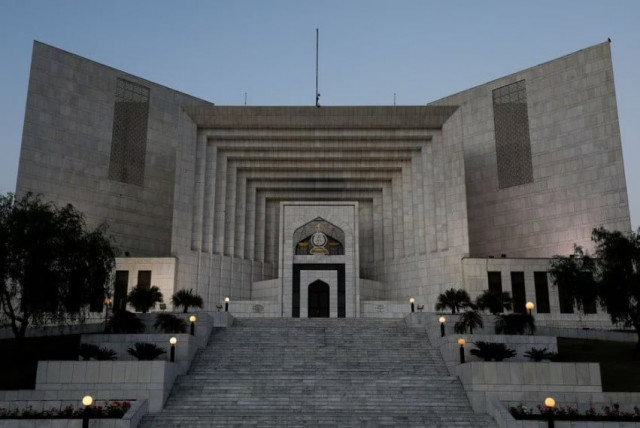Isa-led panel also objects to leaks bench
Says govt not bound to consult with CJP before forming inquiry commissions

After the federal government, the judicial commission probing into some leaked audio clips involving some serving and former judges and their family members has also raised objection to composition of a Supreme Court bench hearing pleas against the commission.
“One of the audio clips allegedly pertains to the mother-in-law of the honorable chief justice [of Pakistan]. Honorable Mr Justice Munib Akhtar may also be mentioned in the said recording.
“And in another audio recording reference is made to case fixation before a particular bench headed by honorable Mr Justice Ijazul Ahsan,” said a concise statement submitted by the commission’s secretary Hafeezullah Khajjak to the Supreme Court on Wednesday.
On May 20, the federal government formed a three-man judicial commission, led by SC’s senior puisne judge Qazi Faez Isa, to probe into the genuineness of over half a dozen audios that surfaced in the last few months.
A number of petitioners challenged formation of the commission and on May 27 a Supreme Court bench led by Chief Justice of Pakistan (CJP) Umar Ata Bandial and comprising four other judges including Justice Akhtar and Justice Ahsan suspended proceedings of the commission.
In its concise statement submitted to the court on Tuesday, the federal government requested the CJP as well as Justice Ahsan and Justice Akhtar to recuse themselves from hearing the case in view of “conflict of interests”.
The commission’s statement said the oath taken by the CJ and judges of the Supreme Court and high courts require them to act “in accordance with the Constitution…and the law.”
“They are required to ‘abide by the code of conduct issued by the Supreme Judicial Council (SJC) and not to allow ‘their personal interest to influence’ their ‘official conduct’ or ‘official decisions’.
It argued that the Inquiry Commission Act, 2017 grants the federal government the power, under section 3(2) to constitute inquiry commissions.
“The act does not stipulate that the government must consult with the CJP before it constitutes a commission. The act also does not grant the CJP the power to nominate members of the commission.
“Merely because the government may elect to consult the CJP does not mean that it has to. The act has existed for over six years and to the best of the knowledge of the undersigned, no challenge to it or specifically to its section 3(2) has been made,” said the statement.
While suspending the commission’s proceedings, the five-judge SC bench on May 26 noted that: “Prima facie, the very constitution of the commission is cast in doubt as the government did not consult the CJP for the nomination of a judge.”
The SC’s 8-page order said it is an accepted and settled constitutional principle, acted upon several times in the constitution of commissions, that whenever a sitting judge is intended to be made a member of the body, the permission of the CJP has to be sought first.
“Since this power was peculiar to the said office, the incumbent for the time being of the same could neither divest himself nor be divested by the federal government from discharging the constitutional duty,” the SC order stated.
The inquiry commission’ statement said at the last hearing, the counsel for a petitioner claimed that the commission had assumed the power of the SJC, adding that the counsel had failed to point out the commission’s May 22 order.
It said the commission in that order clarified that it is not the SJC. The commission will not be assuming the power of the SJC and it will endeavor to perform its function to the best of its ability as per the notification and in accordance with the act.
Bench adjourns for one week
The CJP led bench hearing pleas against the inquiry commission adjourned for one week minutes after the start of the proceedings on Wednesday. Justice Bandial noted that the bench will take up the objections raised to the composition of benches at the next hearing.
Addressing Attorney General for Pakistan (AGP) Mansoor Awan, the CJP said the SC registrar office has returned the statement objecting to the composition of the bench.
“It is a norm that objections to judges are raised before the bench,” he said. “The registrar office does not accept requests objecting to the formation of a bench.”


















COMMENTS
Comments are moderated and generally will be posted if they are on-topic and not abusive.
For more information, please see our Comments FAQ